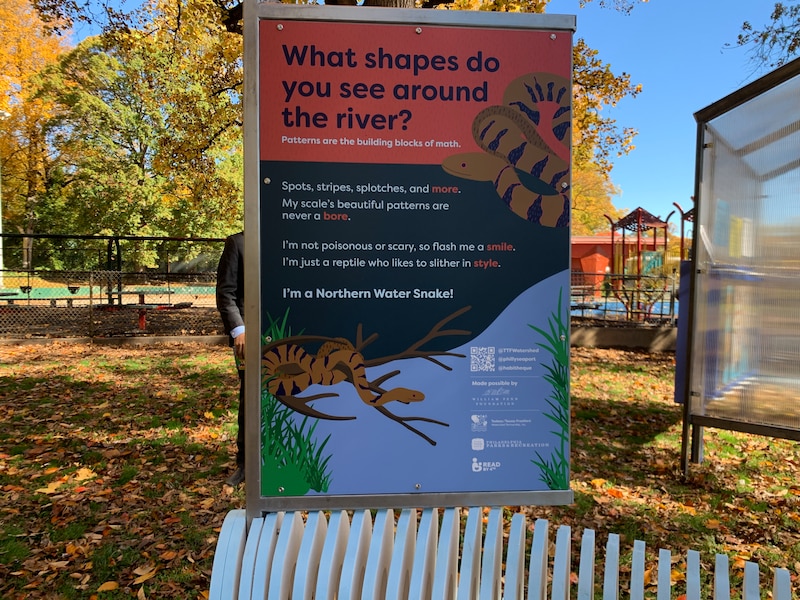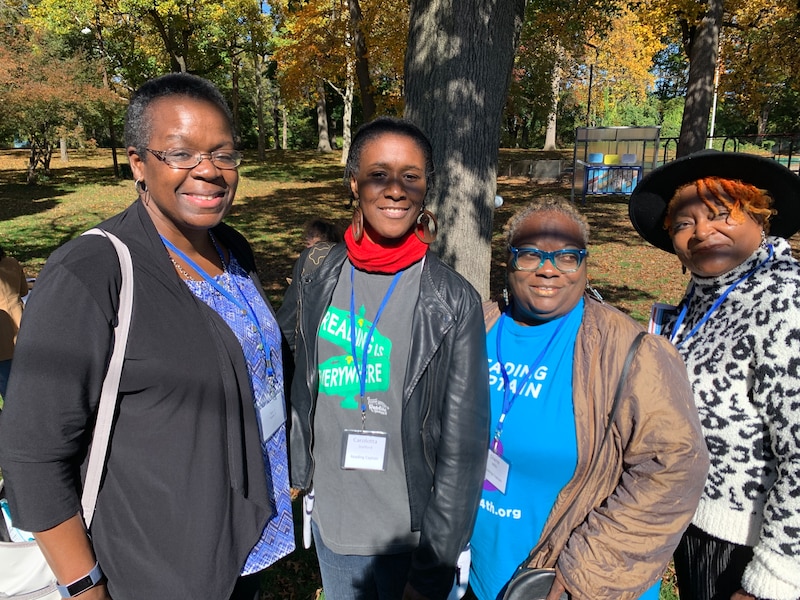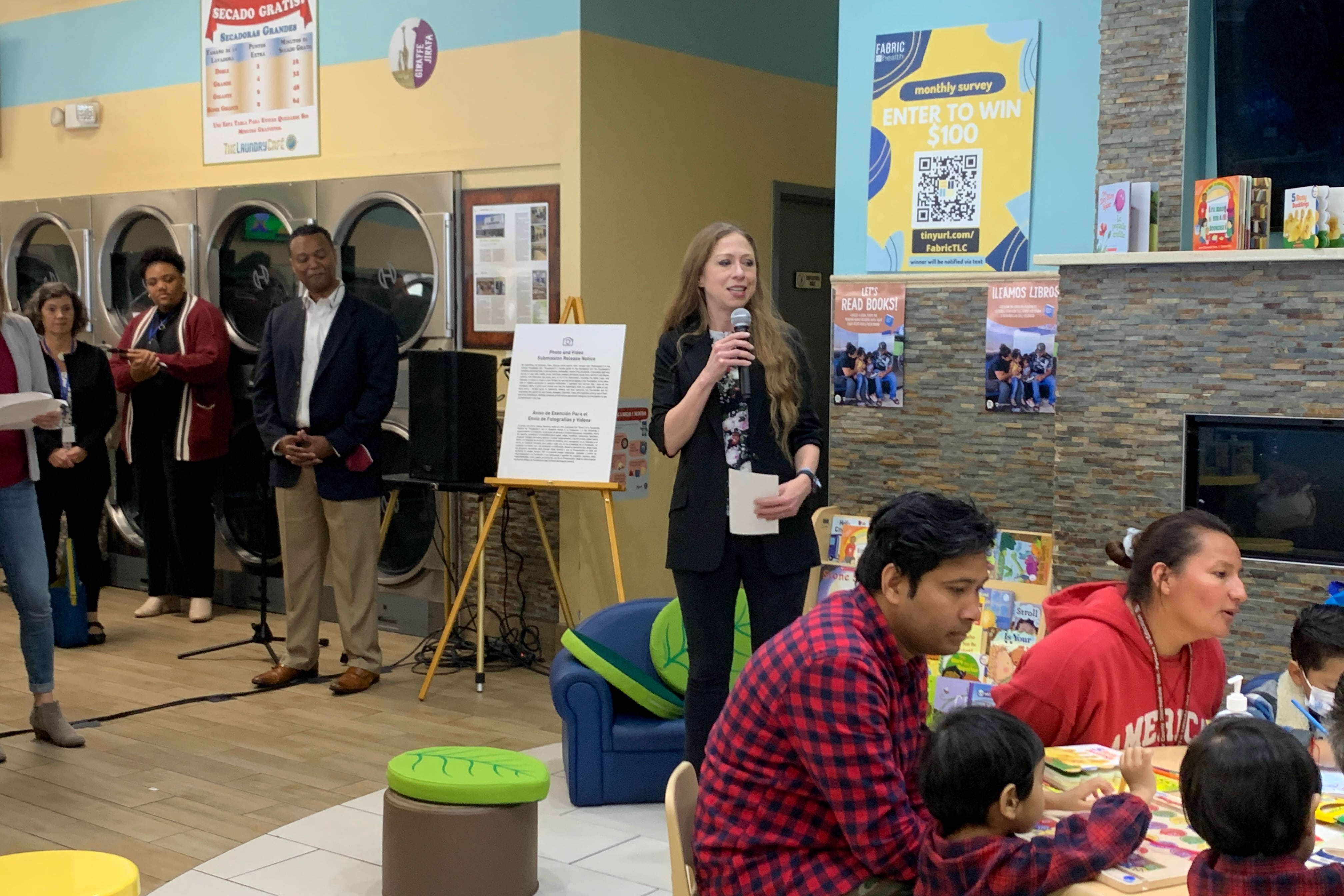Temple University psychology professor Kathy Hirsh-Pasek one day was pondering the fact that only 20% of children’s waking hours are spent in school.
Then she spied a bench.
“Does a bench have to just be a bench?” she asked herself. “Is it just for sitting, or can we do other things with benches?”
She called an architect friend. “We could make a bench into a scale,” she said. “Kids could be doing measurements using the bench.” Benches could add movable parts that create puzzles to promote math skills. A map in front of a bench for students could orient them to their surroundings.
She thought further. Why can’t a bus stop be a place of learning? What about a grocery store? “We could turn the entire city into learning opportunities,” she thought.
And so the playful learning movement was born. It seeks to make public settings – buses, laundromats, public parks, grocery stores, and waiting rooms in health centers and doctors’ offices — places of active learning by including displays that catalyze conversations and activities with children into literacy and knowledge.
“It’s building cognitive science into the architecture of everyday spaces,” Hirsh-Pasek told a group of about 100 people assembled Thursday to tour places in Philadelphia where the approach to learning has taken hold.
Chelsea Clinton, daughter of former President Bill Clinton and former Secretary of State Hillary Clinton, participated in the half-day of activities to celebrate the city as the epicenter of the initiative, which is gaining traction around the country. She took the tour, which included a laundromat, park, and health center, all with activities and signs that invite children and their caregivers to talk about their surroundings.
“It’s a joy to feel the passion here in Philadelphia. What is happening here needs to radiate across the state and the country,” said Clinton, vice chair of the Clinton Foundation, which funds the Too Small To Fail initiative focused on the needs of young children around the country, including Philadelphia.
Among the tour participants were city and foundation officials and community members who have been enlisted as “reading captains” through the city’s Read by 4th partnership, which aims to have all children reading on grade level by fourth grade. Most participants were transported around the city on two SEPTA buses, which were decorated with signs designed to promote reading and conversation.
One bus sign had a picture of a traffic light and said, “I spy with my little eye something that slows things down.” Another had pictures of meat, fictional character Eeyore, and a meteor, with the prompt to “Shout Out Sound-Outs.”
At the River Alive! Learning Trail in Tacony Creek Park, there were sculptures of different animals with grooves in them to direct the path of water. Big benches had signs asking questions like, “What shapes do you see around the river?”

“Learning can’t and shouldn’t happen only in a classroom,” Clinton said during a stop at the Laundry Café at 4th and Allegheny. Philadelphia is a leader in early literacy and playful learning, Clinton said, because it has the lucky convergence of researchers like Hirsh-Pasek and institutions like the William Penn Foundation, which organized the tour and invests heavily in programs directed at children from birth to age eight. (The William Penn Foundation is a funder of Chalkbeat.)
Clinton noted that city leadership also has a commitment to child welfare and early education. Deputy Mayor for Child Welfare Vanessa Garrett Harley and Commissioner of Parks and Recreation Kathryn Ott Lovell attended Thursday’s event.
“I don’t think there are many other places where all of that is true,” Clinton said of the united front from so many different sectors. Mayor Jim Kenney joined the group in the Laundry Café, reiterating his oft-held position that education is the key function of government, and lamenting that the American system – where wealthier districts have more money to spend than less affluent ones with greater challenges — doesn’t give all children what they need to thrive.
“Almost every other civilized country gets it but us,” he said, praising the effort and the involvement of philanthropic organizations like the Clinton Foundation and William Penn, as well as businessmen like Brian Holland, founder and owner of the Laundry Café.
He opened the laundromat and made it a literacy-rich environment in an effort to bring “meaningful change” to his neighborhood, said Holland, who grew up in impoverished Chester. He added, “It’s going to take a generation to see the results.”

Philadelphia’s early literacy rate is still low – fewer than one in five fourth graders met the proficiency benchmark in 2021 on the National Assessment of Educational Progress. Clinton said that’s a sign that “we haven’t been doing enough ever to really invest in kids, and we haven’t been doing enough recently to recover from the learning loss after Covid.”
Hirsh-Pasek and others stressed that the key to the success of the playful learning movement is to get community buy-in. Several Read by 4th reading captains – who function as block captains for reading – say that they see changes in their neighborhoods.
“Our goal is to get students to read proficiently by fourth grade,” said Diane Mills, who coordinates reading captains in West and Southwest Philadelphia. “We tell parents they can help even if they don’t know how to read themselves. Literacy is a lifestyle, and we want to build it block by block.”
Dale Mezzacappa is a senior writer for Chalkbeat Philadelphia, where she covers K-12 schools and early childhood education in Philadelphia. Contact Dale at dmezzacappa@chalkbeat.org







